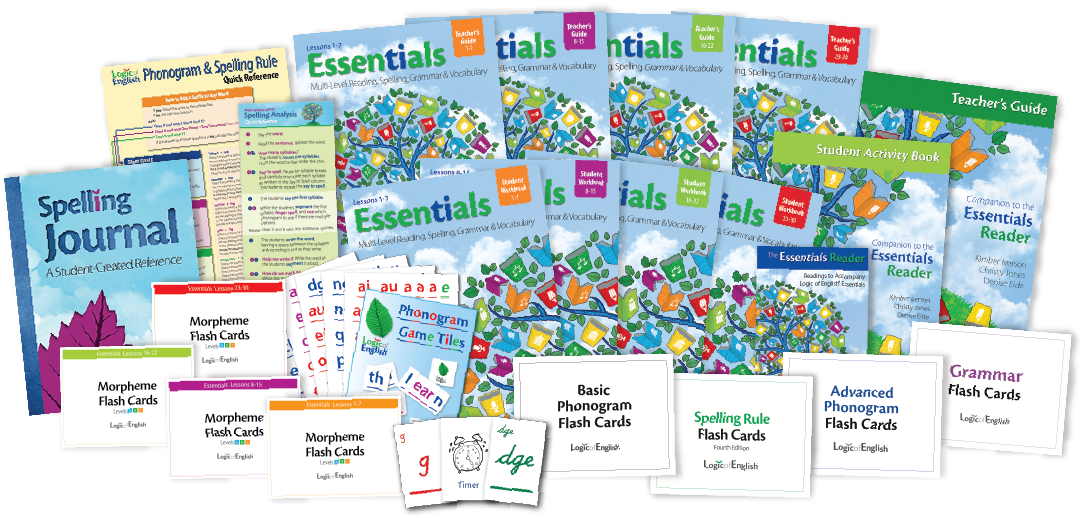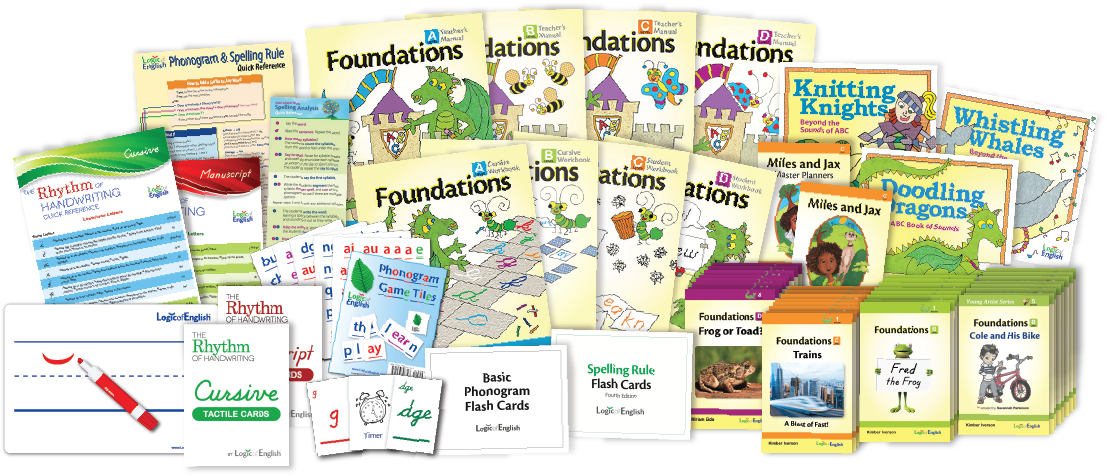How did you choose a Homeschool English Curriculum
 When we first began our homeschool journey, I struggled to figure how to explain English to my oldest son.
When we first began our homeschool journey, I struggled to figure how to explain English to my oldest son. He was very good at identifying letters, and even sounding out words, but there were some words that I just didn’t know how to help him with. Why do some words use an “A” when it clearly makes more of what I learned would be a short “O” sound? Why do some words use an “O” when it clearly makes more of a short “U” sound? I had no good explanation beyond “That’s just how it’s spelled.” Leaving him to memorize hoards of words from a very young age and struggle with sounding things out.
Then, our family went to a homeschool convention to see what was out there as curriculum options in the homeschool world. One of the gems we stumbled upon while exploring the vendor tables was one called Logic Of English.
Logic? In English? Was it possible? I was instantly attracted to the name, as I never felt like English had any real logic to it, so I was curious what they might have known that I didn’t. I started a conversation with them and learned some fascinating things:
- Did you know that in school they used to teach cursive first before learning manuscript handwriting? I asked them why (naturally), and they explained that it helped to solidify individual words because the letters were connected and then there was a break before the next word started. It also helped because b, d, p, and q are more distinguishable in cursive and it makes it easier for kids to keep them straight. That made a LOT of sense to me!
- There are actually 75 phonograms, not just the 26 letters we traditionally learn. Phonograms are groups of letters that make a sound or sounds.
- There are morphemes that can help us to understand the meaning of words we haven't seen before and make reading more enjoyable. A morpheme is a group of letters that have a specific meaning. Learning morphemes can make test-taking significantly easier. While homeschooling gives us a lot of freedom from testing, it's nice to know that if they choose to take an SAT or ACT, or need to do any sort of placement testing down the road, they have the skills to do that.
They shared more tidbits about the English language - things I never had heard in all of my years of schooling.
So we took the plunge and bought the curriculum. From the very first lesson, I was learning things that made spelling and grammar easier for me to teach, because for the very first time in my life, I actually understood WHY. There are actual rules we never learned in school, and they made reading and writing dramatically easier for us all to understand.

Now both of my boys fly through chapter books, they write stories of their own, and they pronounce, spell, and write well too. They know their parts of speech (nouns, verbs, prepositional phrases, adverbs, conjunctions), and can diagram sentences better than most adults. If there were an English competition, I would bet on my kids winning about 90% of the time at least.
 Something else I really love about their curriculum is that for the main part of the program (Essentials), the 4 main books are repeated 3 times - each time with a little more depth. This means that for my boys, they can both work on the same lesson at their own level, and my teaching for them both becomes much more efficient.
Something else I really love about their curriculum is that for the main part of the program (Essentials), the 4 main books are repeated 3 times - each time with a little more depth. This means that for my boys, they can both work on the same lesson at their own level, and my teaching for them both becomes much more efficient. I also love that they are learning about types of writing (fiction, non-fiction, poetry, etc), and understand how to find the main ideas, main characters, setting, theme, and more.
The Essentials curriculum takes them all the way through grammar school, and the only thing I have to do is make sure they have new workbooks for each round. (We prefer to keep our lessons in the workbooks so that they stay together for record keeping, but they do have digital versions that can be printed instead)
 I also love that there are games in the Foundations (preschool-first grade level) curriculum that involve getting up and moving throughout the lessons. Even though my oldest didn't start until 2nd grade, so he jumped right in to the Essentials, he loved playing the games with his younger brother, which helped them both to learn.
I also love that there are games in the Foundations (preschool-first grade level) curriculum that involve getting up and moving throughout the lessons. Even though my oldest didn't start until 2nd grade, so he jumped right in to the Essentials, he loved playing the games with his younger brother, which helped them both to learn. When the body is engaged, the mind is fully activated, and when we are having more fun, we are more able to grasp new concepts. The fact that I don’t have to come up with the creative ideas for making the lessons fun is a huge burden off my shoulders. I can simply follow the lessons and they provide the materials for it. And while a little bit of pre-planning for upcoming lessons would have been good, we managed just fine even when I didn't get a chance to do that (which was most of the time, let's face it).
Now that my oldest is wrapping up his last round of the Essentials curriculum, we will be moving on to something different, and I'll be sure to tell you what we are doing that works!




















0 Comments